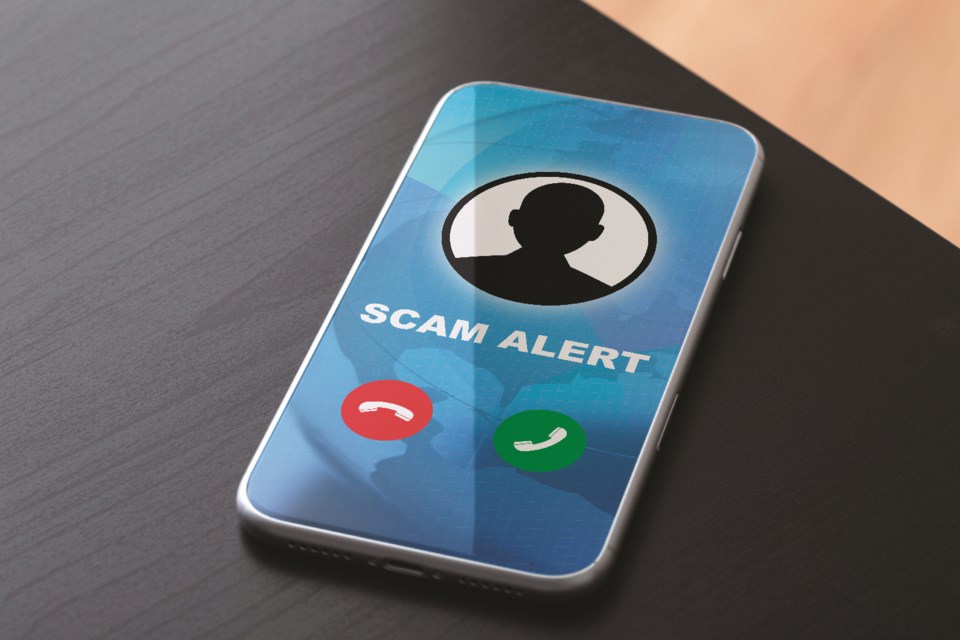March is Fraud Prevention Month, and Christina Zoernig, a federal policing strategist with the RCMP K Division, said the month-long crime prevention initiative is aimed at educating and informing consumers and communities on how to recognize, report, and stop fraud.
“Ultimately, we want to help Canadians better protect themselves and their loved ones from instances of fraud while also encouraging those who have been targeted by – or even those who think they may be a target of fraud – to come forward and file a report with their local police,” she said.
Zoernig said members from the Provincial Financial Crime Team and the Integrated Market Enforcement Team (IMET), both of which are part of the RCMP’s Federal Policing program in Alberta, have been engaging the public at events in Edmonton and Calgary to help raise awareness.
Many common scams that are being seen include emergency scams, phone scams, as well as romance and cryptocurrency scams.
When attempting an emergency scam, Zoernig explained the scammer may claim to be a loved one, a lawyer or the police, and will often say they require money for bail, a medical emergency, or even to pay a fee to release a package from a courier. Whatever the scenario, it usually involves a loved one in legal trouble and the scammer will pressure the target for money.
Phone scams typically involve a scammer calling a target on the phone under the guise of winning a prize, an issue over false billing, or air duct cleaning services, for example.
“While phone scams can use multiple approaches, the general intent is to pressure you into providing your personal information,” she said.
“Romance scams,” she said, often involve scammers using an email or fake social media profile to engage a target in an online, virtual relationship. Once a rapport is established, they may request money, investment in cryptocurrency, and they may invite the target to join them on a business venture.
Zoernig said cryptocurrency scams commonly involve defrauders attempting to steal money, personal or financial information by offering cryptocurrency buy-ins, promising a high rate of return in a short period of time.
How can people protect themselves?
While there are many types of scams that use a variety of mediums, RCMP emphasize that fraudsters rely on urgency and secrecy to make scams work, meaning they want victims to act without thinking and not speaking with anyone who may help them notice that they are indeed being scammed.
“In any situation where you are being pressured to act quickly or told not to speak with anyone, those are huge red flags,” stated Zoernig. “Don’t be pressured to act and always talk to someone about it. Police are always happy to answer questions and hopefully prevent the scam.”
As far as password safety is concerned, it is important for people to use unique passwords and passphrases for every account and device they own, as this is the best way to protect personal information. The stronger the passwords are, the more secure an individual’s information will be.
Some general best practices include:
-
Using a passphrase that combines four or more random words to create a unique password
-
Do not use the name of a pet or a family member
-
Do not share your password with anyone
-
Do not use the same password on more than one account or device
If someone believes they are victim of fraud, Zoernig said it is vital to report this to the police. Otherwise, RCMP cannot investigate the crimes.
“Most importantly, without your information, we cannot help prevent others from being victimized,” she stated.
Cpl. Sean Milne, a member of the Alberta RCMP Provincial Financial Crime Team, said whether someone is a business or is looking to employ a company’s services, they must take every precaution by familiarizing themselves with the warning signs of a possible scam.
“I cannot overstate the importance of protecting your personal and financial information,” Milne stated.
Sgt. Patrick Russell of the Cold Lake RCMP said that while scams occur sometimes, it’s not a prevalent issue in Cold Lake. Regarding which ones are the most common, Russell said there are so many scams out there, and it is difficult to discuss all of them.
“Basically, it comes down to: If you receive unsolicited calls or emails that roll into demands for cash or gift cards... It’s a scam,” he said.



